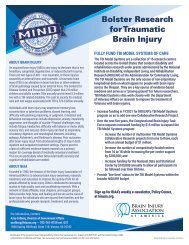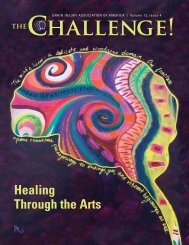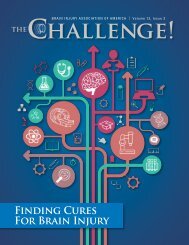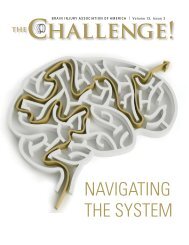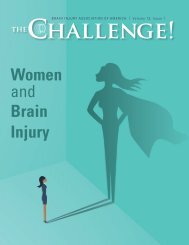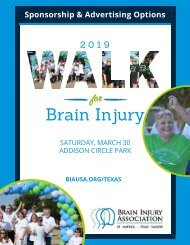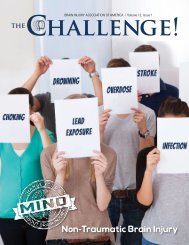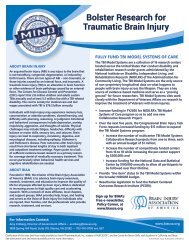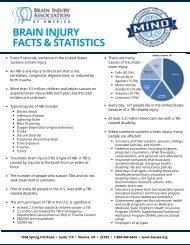THE Challenge! Spring 2011
Communication
Communication
Create successful ePaper yourself
Turn your PDF publications into a flip-book with our unique Google optimized e-Paper software.
Classifying<br />
Brain Injury<br />
And indeed, diseases can be caused by external forces such as<br />
injuries. An individual sustaining a severe chemical burn to the<br />
lungs will develop chronic lung disease that may then cause<br />
or accelerate cardiac disease. Although the phenomenon is not<br />
clearly understood, following chemotherapy, many patients<br />
may develop disabling problems with memory, attention,<br />
multi-tasking and other domains of cognitive function, known<br />
as “chemo brain.”<br />
In a 2004 study on mortality one year post TBI among 2,178<br />
individuals with a moderate-to-severe TBI, it was reported that<br />
individuals with a TBI were twice as likely to die as a similar<br />
non-brain-injured cohort and had a life expectancy reduction<br />
of seven years. Follow-up studies on causes of death revealed<br />
that individuals surviving more than one year with a TBI<br />
are 37 times more likely to die from seizures, 12 times more<br />
likely to die from septicemia, four times more likely to die<br />
from pneumonia, and three times more likely to die from other<br />
respiratory conditions than a matched cohort from the general<br />
population. The greatest proportion of deaths in the study –<br />
29 percent – was from circulatory problems.<br />
Several neurologic disorders are associated with TBI, all of<br />
which present a level of disability, with varying degrees of<br />
severity. TBI is a major cause of epilepsy, accounting for<br />
five percent of all epilepsy in the general population. Visual<br />
disturbances are common with TBI, as are sleep disturbances<br />
and hypersomnia. TBI can be a risk factor for the development<br />
of Alzheimer’s disease. It also can cause Chronic Traumatic<br />
Encephalopathy (CTE).<br />
Classification of TBI as the beginning<br />
of a disease process would facilitate<br />
treatment as outlined for the full<br />
continuum of care, which should<br />
be paid for by medical insurers and<br />
managed on a par with other diseases.<br />
A moderate-to-severe TBI is associated with a host of<br />
neuroendocrine disorders, including hypopituitarism; growth<br />
hormone (GH) deficiency/insufficiency; hypothyroidism; and<br />
gonadotropin deficiency in both men and women. Each of these<br />
disorders has negative effects associated with them; each of<br />
which leads to a progressive disease process.<br />
Incontinence, both of the bladder and bowel, can occur with TBI<br />
because it frequently affects the cerebral structures that control<br />
bladder storage and emptying functions. TBI also causes sexual<br />
dysfunction. Additionally, it causes musculoskeletal dysfunction<br />
(Continued on pg. 28)<br />
<strong>THE</strong> <strong>Challenge</strong>! | <strong>Spring</strong> <strong>2011</strong><br />
10





